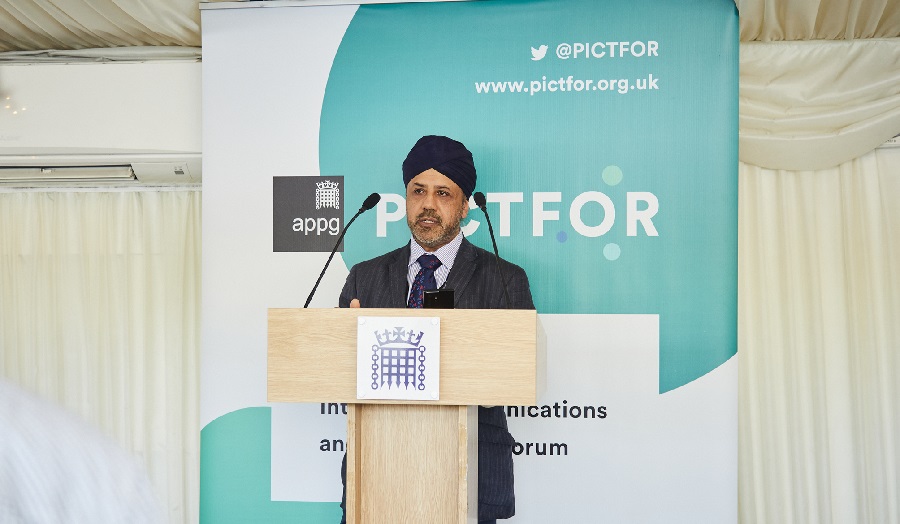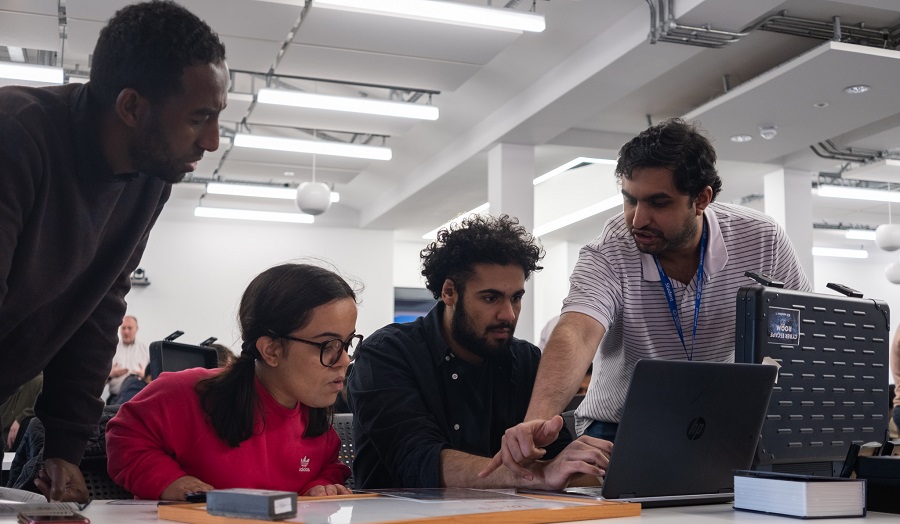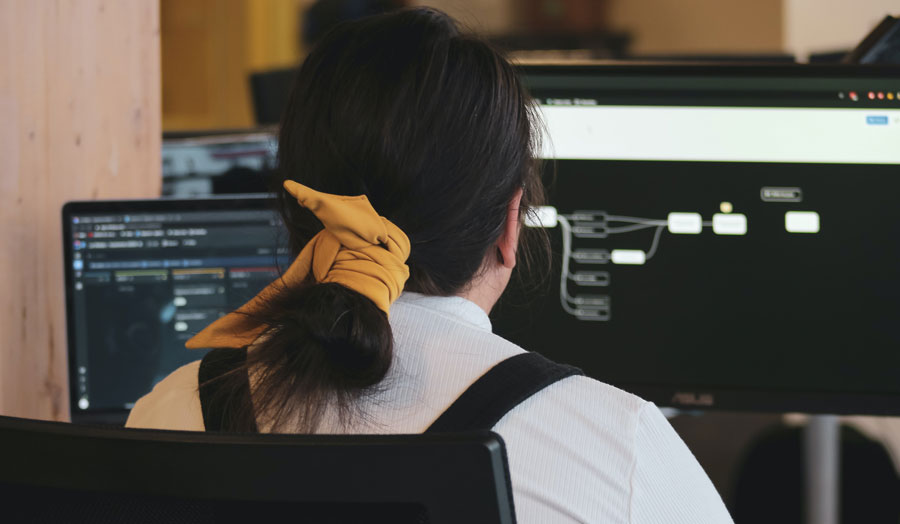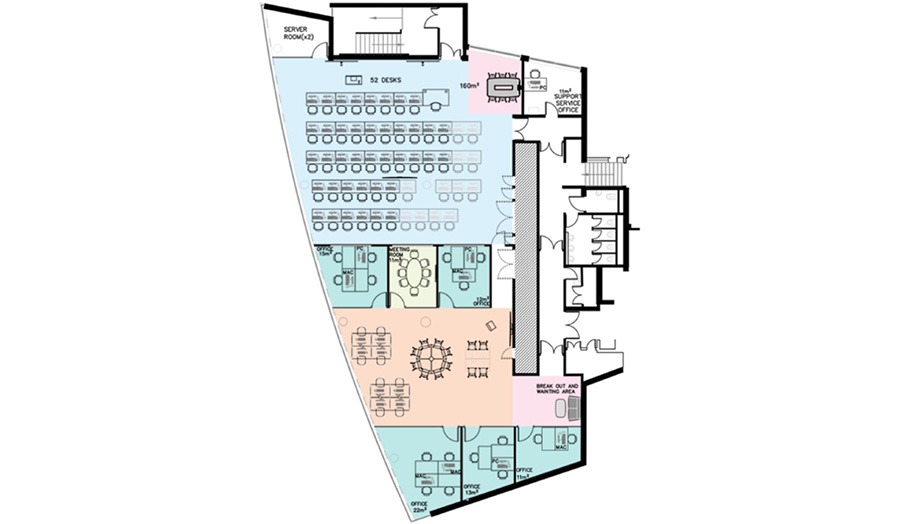Apply for this course
Please select when you would like to start:
If you're a UK applicant wanting to study full-time starting in September, you must apply via UCAS unless otherwise specified. If you're an international applicant wanting to study full-time, you can choose to apply via UCAS or directly to the University.
If you're applying for part-time study, you should apply directly to the University. If you require a Student visa, please be aware that you will not be able to study as a part-time student at undergraduate level.
Why study this course?
Welcome to the next step on your path to a career in computer networking and cloud security. Taught in our School of Computing and Digital Media, this course will equip you with the latest technical and practical knowledge of computer networks, along with the cloud and security technologies that are indispensable for both business and personal users. As you progress through this specialist programme you’ll acquire the skills to assess, plan, design and develop secure and reliable networks and systems.
During your studies on this Computer Networking and Cloud Security BEng course you’ll learn:
- to secure systems from hardware and software vulnerabilities and organised hacking through a Cisco and Palo Alto based skills-set
- prevention methods to both known and unknown attacks and the features of next generation firewalls, including user identification, data/URL filtering and denial of service prevention
Supported by training in its theory, our practice-led approach makes use of the equipment and tools that are considered indispensable across the industry.
This degree is career-focused and vocational elements are integrated within the course content. With these skills you’ll hit the ground running to begin your career in the exciting and growing field of cyber security operations.
Second in the UK for student satisfaction
Our computer science courses are ranked second in the UK for student satisfaction in the Complete University Guide 2025
Combine theory with practice in our state-of-the-art laboratories
London Met is the proud home of the UK’s first ever Cisco Networking Academy and the first ever Palo Alto Networks regional academy
Vocational skills integrated into the course
This degree is career-focused and vocational elements are integrated within the course content
Course modules
The modules listed below are for the academic year 2024/25 and represent the course modules at this time. Modules and module details (including, but not limited to, location and time) are subject to change over time.
Year* 1 modules
Year 2 modules
Year 3 modules
Communications Engineering
This module currently runs:all year (September start) - Friday morning
(core, 30 credits)
This module introduces a range of fundamental concepts in information and communication technology (ICT). It gives an understanding of what ICT is and give examples of its practical applications in everyday life, and discussed are ethical, social, economic and environmental issues in relation to the ICT field.
Read full detailsComputer Hardware and Software Architectures
This module currently runs:all year (September start) - Monday afternoon
all year (January start)
(core, 30 credits)
The module introduces students to the basics of Information Technology; past, current and future trend in computer systems. The detailed design of a small-scale Computer Systems is presented where students have the opportunity to build, configure and test a computer system for a given application. Students will identify the basic features of the Windows operating system and its elements. Health Safety issues and the safe disposal of equipment is also covered leading to an understanding and appreciation of social, ethical, environmental and economic issues related to computer’s hardware and software element. The module aims to
1. Introduce students to the fundamental concepts of Information Technology and basic networking,
2. Provide a working technical knowledge of modern computer systems and their respective components,
3. Introduce Operating systems by focusing on Windows products, identifying similarities and differences,
4. Identify the correct approach to preventive maintenance and upgrading and troubleshooting
5. Introducing students to Assembly language and how it interacts with hardware
6. Awareness of social, environmental, commercial and economic aspects of PC technology
Electronics Systems
This module currently runs:all year (September start) - Friday afternoon
(core, 30 credits)
The module is designed to introduce the most common electronics devices and their applications in small-scale systems. The module is divided into two broad sections of analogue and digital electronics. The module is based on formal seminar/lecture sessions followed by comprehensive practical/tutorial sessions in both areas which provide an opportunity for students to gain experience in using and applying the laboratory’s test and measurement equipment/simulators.
The aims of the module are as follows:
1. 1. To familiarise students with commonly used electronic components, standard laboratory test and measurement equipment and their usage in designing/analysing, building, and testing simple electronic circuits/systems.
2. 2. To introduce students to circuit simulation software and develop an awareness of its strengths and limitations
3. 3. To introduce students to the electronics and measurement techniques through practical approach and provide scope for putting theory into practice and develop investigation/analysis skills that exemplify core electrical and measuring principles relevant to the course.
4. 4. To develop the ability to write a well-structured, concise and thoughtful logbook / report / poster.
5. To develop the ability to work independently as well as in team
Networking Concepts (CCNA1 and 2)
This module currently runs:all year (September start) - Thursday afternoon
autumn semester - Monday evening
autumn semester - Wednesday evening
autumn semester - Saturday morning
spring semester - Tuesday evening
spring semester - Thursday evening
spring semester - Saturday morning
(core, 30 credits)
This module focuses on fundamental network terminology and concepts including protocols, Open System Interconnection (OSI) and TCP/IP models, Ethernet, Internet Protocol (IP) addressing, Routing protocols and network devices, such as routers and switches. The module provides an opportunity for students to understand the interconnections of various networks and be able to design and configure small-scaled networks based on typical (customer’s) requirements.
The aims of the modules are as follows:
• To provide a firm understanding of networking terminology, models and mathematics.
• To introduce students to copper, optical, and wireless networking.
• To introduce the concepts of Ethernet switching, VLANs and inter-VLAN routing
• To enable students to perform subnetting of IPv4 addresses and introduction to IPv6.
• To gain an in-depth understanding of static routing protocols and default routing.
• To gain an in-depth understanding of end-to-end connectivity using routers and switches and their security.
• To gain experience in designing router’s configuration for a given specification.
• To gain understanding of redundancy in a switched network.
Enterprise Networks and Security
This module currently runs:all year (September start) - Tuesday afternoon
autumn semester - Monday evening
autumn semester - Wednesday evening
autumn semester - Saturday morning
spring semester - Tuesday evening
spring semester - Thursday evening
spring semester - Saturday morning
(core, 30 credits)
This module develops analytical and practical knowledge and skills for configuring and managing Internetworking devices in small-to-medium as well as large Enterprise Networks. It focuses on switching technologies and router operations that support small-to-medium business networks, including security concepts within Local Area Networks (LANs). It also promotes the architectures and considerations related to designing, securing, operating, and troubleshooting enterprise networks. It covers wide area networks (WANs) technologies and quality of service (QoS) mechanisms used for secure remote access along with the introduction of software-defined networking, virtualization, and automation concepts that support the digitalization of networks. It provides further experience of laboratory team working and individual trouble shooting in LANs vulnerabilities, threats and security, switch security to mitigate LAN attacks, WLANs, IPv4 and v6, OSPF Operation, NAT, VPNs, Troubleshooting enterprise networks. In the lab students work in a group of 3 to 4 to plan and design a mock network for a commercial client. Students demonstrate knowledge and understanding of commercial, environmental, social and economic issues related to Enterprise networks.
Read full detailsMicroprocessors & Embedded Systems
This module currently runs:all year (September start) - Tuesday morning
(core, 30 credits)
This module introduces students to the concepts of microprocessors and the role that hardware and software play in the functional behaviour of microprocessor systems. Students are then introduced to some of the more common microcontrollers. Interfacing external memories as well as various input/output devices and sensors are also covered. The module enables students to analyse the requirements of a given task, make decisions in selecting an appropriate controller, design and implement prototype hardware/software for a typical embedded systems product. Practical workshops are designed to introduce microprocessor software development, testing and debugging. Workshops provide students with an opportunity to use both ‘C’ and assembly language.
Read full detailsMobile Communications Systems
This module currently runs:all year (September start) - Friday afternoon
(core, 30 credits)
This module examines the technology underlying current and future mobile wireless systems. It provides the essential theoretical principles and concepts encountered in the design of typical modern communications systems. Various analogue and digital modulation schemes essential for information transmission are examined, including the detrimental effect of noise in limiting system performance.
Read full detailsNetwork Operating Systems
This module currently runs:autumn semester - Thursday morning
(core, 15 credits)
This module helps the students to develop the theoretical and practical knowledge of Network Operating Systems, used by the enterprise today. This is achieved by exposing the student to some of the most commonly used network operating systems. The student will reinforce their theoretical knowledge in practical sessions where they will install configure, manage and troubleshoot network operating systems.
The module covers the necessary background through formal lectures/seminars followed by comprehensive hands-on practical workshops.
The aims of this module are:
1. To understand the importance of Network operating systems (NOS)
2. To explain the operation of Network operating systems, and their benefits
3. To describe hardware requirements for the effective operation of NOS
4. To compare some of the most commonly available NOS, and their abilities and limitations
5. To understand the concept of virtualisation and its application in modern server environments
6. To understand server documentation, security and trouble shooting
Work Related Learning
This module currently runs:autumn semester - Wednesday afternoon
spring semester - Wednesday afternoon
(core, 15 credits)
This module consists of a short work placement (or work-related activity) lasting over one semester. This usually translates into 12 to 15 full working days (or the part time equivalent of this) in the framework of 150 hours (15-credit module) considering some time for reflection, research and documentation. The work placement is facilitated by the University's Careers and Employability Team. The module enables students to undertake an appropriate short period of professional activity, usually related to their course at level 5 (Intermediate level), with a business or community organisation and to gain credit for their achievements. The activity can be student’s part-time job, a volunteering activity, employment activity, an activity within Londonmet, an activity related to client’s brief or business start-up activity.
The module aims to provide students with the opportunity to:
• gain a useful experience of the working environment.
• undertake a real work-related activity/project appropriate at level 5.
• enhance and extend their learning experience by applying and building on their
academic skills and abilities by tackling real life problems in the workplace.
• enhance professional and personal development.
• develop and document employability related skills
Read full detailsCyber Security Operations (CCNA Cisco Cyber Ops)
This module currently runs:autumn semester - Wednesday morning
(core, 15 credits)
This module is based on Cisco Cybersecurity Essentials and CCNA Cybersecurity Operations (Cyber Ops) curriculum delivered through Cisco Networking Academy at the University.
The CCNA Cybersecurity Operations curriculum provides a first step in acquiring the knowledge and skills needed to work as a Security Analyst within a Cybersecurity Operation Centre (SOC) and can be a valuable part of beginning a career in the exciting and growing field of cybersecurity operations. It explores the characteristics of and tactics used by cyber criminals and procedures used by cybersecurity professionals to combat cybercrime.
This individual module helps prepare students for entry-level cybersecurity career opportunities and is aligned to the Understanding Cisco Cybersecurity Fundamentals (SECFND) and Implementing Cisco Cybersecurity Operations (SECOPS) industry exams leading to the Cisco full CCNA Cybersecurity Operations certification.
This module is a hands-on, career-oriented e-learning solution offering a blended curriculum with both online and classroom learning with an emphasis on practical experience to help students develop specialised Cybersecurity analyst skills to mitigate security risks in computer networks, along with critical thinking and complex problem-solving skills. To pass this module with good grades, students are expected to have CCNA-level networking concepts knowledge and skills by completing CT4004, along with PC and Internet navigation skills.
In addition, this module provides practical, relevant and skills aligned closely with the specific tasks expected of SOC professionals through various features including rich multimedia content, including interactive activities, videos, games, and quizzes, addresses a variety of learning styles and help stimulate learning and increase knowledge retention. The virtual environments simulate real-world cybersecurity threat scenarios and create opportunities for ethical hacking, security monitoring, analysis and resolution and hands-on labs help students develop critical thinking and complex problem-solving skills. The innovative assessments provide immediate feedback to support the evaluation of knowledge and acquired skills. Technical concepts are explained using language that works well for learners at all levels and embedded interactive activities break up reading of the content and help reinforce understanding. In addition, CyberOps Skills Challenge networked game allows students to use CyberOps skills and knowledge to compete with classmates.
Network Security 1 (Cisco)
This module currently runs:autumn semester - Tuesday morning
(core, 15 credits)
This module is based on Cisco Network Security curriculum delivered through Cisco Networking Academy at the University. This module provides a next step for individuals who want to enhance their CCNA-level skillset and help meet the growing demand for network security professionals. The curriculum introduces the core security concepts and skills needed for the installation, troubleshooting, and monitoring of network devices to maintain the integrity, confidentiality, availability of data and devices and mitigating security risks in the network. This module helps prepare students for entry-level security career opportunities and the globally recognized Cisco Security related certification.
This module is a hands-on, career-oriented e-learning solution with an emphasis on practical experience to help students develop specialized security skills, along with critical thinking and complex problem-solving skills. It offers a blended curriculum with both online and classroom learning. In addition, this module provides practical, relevant and skills aligned closely with the specific tasks expected of security professionals through various features including rich multimedia content, including interactive activities, videos, games, and quizzes, addresses a variety of learning styles and help stimulate learning and increase knowledge retention. The virtual environments simulate real-world cybersecurity threat scenarios and create opportunities for ethical hacking, security monitoring, analysis and resolution and hands-on labs help students develop critical thinking and complex problem-solving skills. The innovative assessments provide immediate feedback to support the evaluation of knowledge and acquired skills. Technical concepts are explained using language that works well for learners at all levels and embedded interactive activities break up reading of the content and help reinforce understanding.
To pass this module with good grades, students are expected to have CCNA-level networking concepts knowledge and skills, along with PC and Internet navigation skills. The module aims include:
1. To provide a firm understanding of Security Policy design and management.
2. To introduce students to security technologies, products and solutions.
3. To provide students with practical experience of configuring firewalls, intrusions prevention system and router security
Network Security 2 (Cisco)
This module currently runs:spring semester - Tuesday morning
(core, 15 credits)
This module is based on Cisco Network Security curriculum delivered through Cisco Networking Academy at the University. This module provides a next step for individuals who want to enhance their CCNA-level skillset and help meet the growing demand for network security professionals. The curriculum introduces the core security concepts and skills needed for the installation, troubleshooting, and monitoring of network devices to maintain the integrity, confidentiality, and availability of data and devices. This module helps prepare students for entry-level security career opportunities and the globally recognized Cisco Security related certification. This module is a hands-on, career-oriented e-learning solution with an emphasis on practical experience to help students develop specialized skills to mitigate security risks along with critical thinking and complex problem-solving skills. It offers a blended curriculum with both online and classroom learning. In addition, this module provides practical, relevant and skills aligned closely with the specific tasks expected of security professionals through various features including rich multimedia content, including interactive activities, videos, games, and quizzes, addresses a variety of learning styles and help stimulate learning and increase knowledge retention. The virtual environments simulate real-world cybersecurity threat scenarios and create opportunities for ethical hacking, security monitoring, analysis and resolution and hands-on labs help students develop critical thinking and complex problem-solving skills. The innovative assessments provide immediate feedback to support the evaluation of knowledge and acquired skills. Technical concepts are explained using language that works well for learners at all levels and embedded interactive activities break up reading of the content and help reinforce understanding.
To pass this module with good grades, students are expected to have CCNA-level networking concepts knowledge and skills, along with PC and Internet navigation skills. The module aims include:
1. To explain how to secure and manage the Local Area Networks (LANs).
2. To explain how to Implement VPN using routers and firewalls.
3. To explain how to implement of AAA (Authentication, Authorisation and Accounting).
4. To explain how to implement cisco adaptive Security Appliances in the network.
Next Gen Firewalls for Network and Cloud Security (Palo Alto)
(core, 15 credits)Students will learn the importance of network security, the range of threats to network infrastructure both from inside and outside, how these threats work, what vulnerabilities exist in the protocols the threats exploit and mitigations to those attacks. The students will learn that the networks and protocols we rely on, have no inherent security built in and that the multilayer multi-protocol nature of computer networking requires a multi technology multilayer security response.
They will learn prevention methods to both known and unknown attacks and the features of next generation firewalls including user identification, data/url filtering and denial of service prevention. The mitigations will be implemented and tested using Palo alto next generation firewalls.
This module leverages the basic network understanding the student has gained at level 4 from CCNA 1 and 2. This module complements but also contrasts CCNA security at level 6 by providing an alternative approach to firewall security compared to CISCO ASAs both in terms of technology, configuration, operation and design philosophy. This module is an essential part of the infrastructure security aspect of the degree and can lead to the professional qualification of Palo Alto Networks Certified Network Cybersecurity Administrator (PCNSA).
Project
This module currently runs:all year (September start) - Wednesday afternoon
(core, 30 credits)
The module enables students to demonstrate their acquired knowledge and skills through a systematic and creative investigation of a project work, either individually or as part of a group, in accordance with their course requirements. The topic of investigation will cover a broad spectrum of various analysis and techniques and will lead to a comprehensive and concise academic/industry-related report. Students will be assisted in exploring areas that may be unfamiliar to them and encouraged to develop innovative ideas and techniques. Students will be able to choose a project that may require the solution to a specific problem, creation of an artefact in a real-world environment or an investigation of innovative ideas and techniques related to an area within their field of study. Collaboration with outside agencies and projects with industrial, business or research partners/ sponsors will be encouraged.
Read full detailsWireless Networks (Cisco)
This module currently runs:autumn semester - Friday morning
(core, 15 credits)
This module aims to provide students with the technical background and skills necessary to design and configure and maintain wireless Lans and Wans.
This module focuses on the design of these networks, the devices used and their operation, the planning prior to installation and best practices , the implementation of the network design, security provisions and troubleshooting of Wireless LANs.
y issues. The module covers the necessary background through formal lectures/seminars followed by comprehensive hands-on practical workshops.
Module Aims:
1. To introduce Wireless LAN set-up & troubleshooting, 802.11 (a, b, and g) technologies, products & solutions.
2. To describe WLAN applications and site surveys;
3. To discuss resilient WLAN products, design, installation, configuration and troubleshooting;
4. To investigate WLAN security issues and emerging wireless technologies;
5. To develop team work and presentation skills in the context of the module curricula;
Read full detailsBroadband Systems 2
(option, 15 credits)The module provides students with an understanding and knowledge in the principles and applications of broadband systems. It covers the key features of broadband systems, their operations and design requirements. The module develops analytical and design knowledge and provides experience of team working through a group work.
Ethical Hacking
This module currently runs:spring semester - Thursday morning
(option, 15 credits)
This module is designed to develop understanding, knowledge and skills associated with the various malicious hacking attacks targeting computer systems and the appropriate safeguards needed to minimise such attacks.
The module aims are to:
1.Provide students with knowledge and understanding of the various hacking methods used in attacking computer systems and networks.
2.Enable students to use appropriate tools and techniques to identify, analyse, evaluate and test computer security vulnerabilities prone to hacking attacks, and develop appropriate procedures, solutions and countermeasures to defend and minimise such attacks.
3.To develop students’ awareness of ethical, professional, and legal issues connected with hacking.
4.Develop students’ knowledge, transferable skills and confidence in the subject leading to further academic and professional progression in this area.
Read full detailsIoT Systems and Security
(option, 15 credits)The module is designed to provide students with technical knowledge and skills on Internet of Things (IoT) technologies. Theoretical material delivered in the lectures is supported by practical lab work to ensure students have a sound grasp of the technical content where students are expected to develop IoT systems. A number of devices, platforms and software tools will be introduced during the course from different vendors. The module is assessed through lab reports and final examination





















.jpg)
.jpg)



